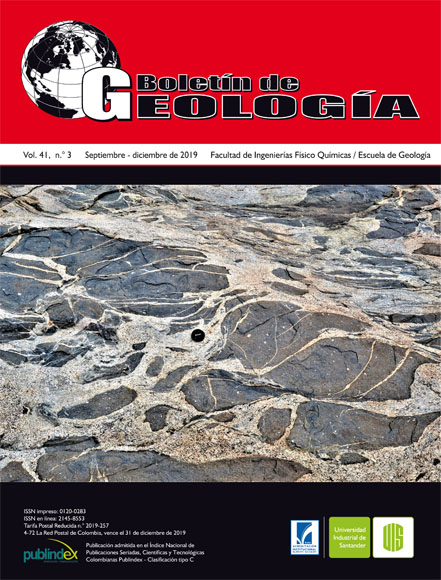Socio-environmental implications of the artisanal exploitation of aggregates in the municipality of Sumbe, Cuanza Sul, Angola
Published 2019-09-30
Keywords
- arids,
- environmental impact,
- artisanal and small-scale mining,
- sustainable development,
- environmental ordering
How to Cite
Altmetrics
Abstract
Artisanal and small-scale mining in the municipality of Sumbe, Cuanza Sul province, Angola, has been practiced for the past 20 years, by many families in need of economic support and materials to build their homes, causing damage to the environment of diverse magnitude. The objective of this research is to identify and evaluate the environmental impacts produced by arid exploitations through artisanal and small-scale mining in this territory, with emphasis on the detection of the main socio-environmental problems generated by these mining activities and the need to establish a regulatory framework based on the sustainable exploitation of these resources through an environmental management strategy. For this, field methods, survey-interview instruments and methods for the identification, characterization and evaluation of environmental impacts were applied. The results obtained allow to clarify the implications that these mining activities have on sustainable socio-economic development, as well as to denounce the indiscriminate use of women and children, all stimulated by the high demand of extracted materials for civil constructions and the economic benefits that they report immediately. The anarchy and irrationality derived from these actions cause moderate environmental impacts and instability of environmental components. Among the measures that are proposed for the environmental ordering of this type of mining activity are considered: a) the creation of cooperatives; b) the establishment of norms that regulate the granting of artisanal mining concessions, with the elimination of the exploitation of the female and child population; c) the application of environmental education programs to the population; d) the development of control instruments for arids mining; e) the implementation of regulations that declare individual and collective responsibilities for the restoration of the environment within a legal framework.
Downloads
References
Cante, F., y Trujillo, L. (2014). Posibilidades de gobernabilidad y gobernanza en distintos tipos de minería. Opera, 14, 27-45.
Castillo, P., Diez, A., Burneo, Z., Urrutia, J., y del Valle P. (2007). ¿Qué sabemos de las comunidades campesinas? Lima: Grupo Allpa. Comunidades y Desarrollo.
Conesa, V. (1995). Guía metodológica para la evaluación del impacto ambiental. 2da. Ed., Madrid: Ediciones Mundi-Prensa.
Davies, T.C., and Osano, O. (2005). Sustainable mineral development: case study from Kenya. Geological Society, London, Special Publications, 250, 87-93.
D’Souza, K.P.C.J. (2005). Artisanal and small-scale mining in Africa: the poor relation. Geological Society, London, Special Publications, 250, 95-120.
De Echave, J., Diez, A., Huber, L., Revesz, B., Ricard, X., y Tanaka, M. (2009). Minería y conflicto social. Lima: Instituto de Estudios Peruanos, Serie: Minería y Sociedad.
Duarte, C. (2012). Gobernabilidad minera: Cronologías legislativas del subsuelo en Colombia. Consultado el 29 de agosto de 2014. http://gobernabilidadminera.wordpress.com
Galvão, L. (1973). Esboço geológico da bacia sedimentar de Benguela a escala 1:250 000. Direcção Provincial dos Serviços de Geologia e Minas, Luanda.
Hilson, G. (2016). Artisanal and small-scale mining and agriculture. Exploring their links in rural sub-Saharan Africa. International Institute for Environment and Development, London. 24 p.
Isasi, F. (2008). Minería en el Perú. Ministerio de Energía y Minas. Consultado el 10 de agosto de 2010. http://www.minem.gob.pe/minem/archivos/file/institucional/publicaciones/presentaciones/exposicion_minas_espa.pdf.
Pascó-Font, A., Trillo, A., Llosa, G., y Naranjo, G. (1994). Estudio de la minería informal y el medio ambiente (Sub-proyecto MIMA), Zona: Madre de Dios. Programa de Asistencia Técnica al Sector Energía y Minas: Lima.
Schuldt, J. (2005). ¿Somos pobres porque somos ricos?: Recursos naturales, tecnología y globalización. Lima: Fondo Editorial del Congreso del Perú.
Shields, D.J. (2005). USA and UN Perspectives on Indicators of Sustainability for the Mineral Extraction Industry. In: R.C. Villas-Bôas, D. Shields, S. Solar, P. Anciaux, G. Önal (ed.). A Review on Indicators of Sustainability for the Mineral Extraction Industries (pp. 19-30). Rio de Janeiro: CETEM/MCT/CNPq/CYTED/IMPC.
Shields, D.J., and Solar, S.V. (2005). Sustainable development and minerals: measuring mining’s contribution to society. Geological Society, London, Special Publications, 250, 195-211.
Van der Meulen, M.J. (2005). Sustainable mineral development: possibilities and pitfalls illustrated by the rise and fall of Dutch mineral planning. Geological Society, London, Special Publications, 250, 225-232.

